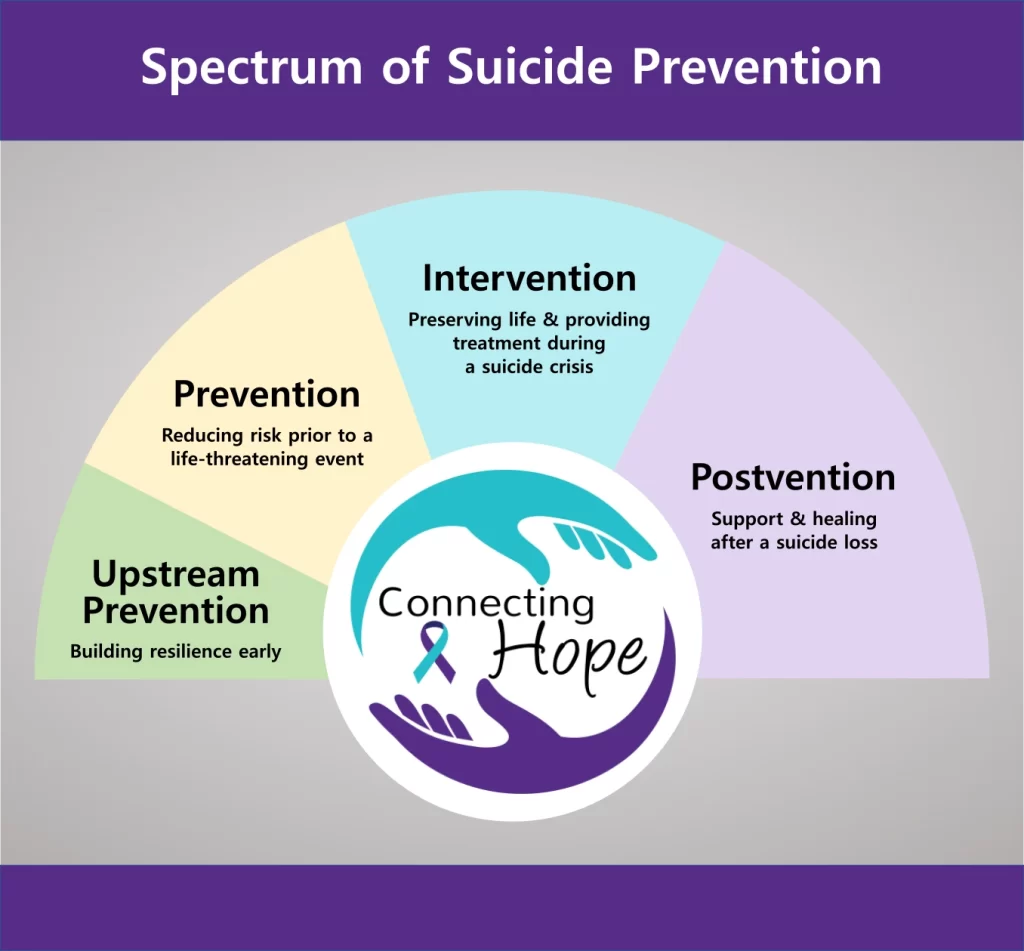Preventing Suicide
Suicide is a complex issue for both individuals and communities. However, research has proven there are effective prevention practices we can use to help reduce the risk of and prevent suicide. The best approach to suicide prevention uses layered strategies to address the issue on multiple fronts. A four-part approach that incorporates Upstream Prevention, Prevention, Intervention, and Postvention is recommended to ensure people who may be at risk for suicide receive the best support.

The Spectrum of Suicide Prevention is a tool that communities and organizations can use to develop plans to reduce the risk of and respond appropriately to suicide.
Upstream Prevention is a term used to describe activities that work to build individual and community resilience, or the ability to bounce back from or deal with hardships early on – before a person has considered suicide. These approaches generally focus on building positive connections, developing personal assets, and promoting wellness and healthy coping.
A few examples of upstream prevention programs used by various communities and agencies in Georgia include:
Prevention refers to a range of activities that are intended to reduce the risk of suicide attempt and death for people who are at risk or are considering suicide. Strategies in this category focus identifying and responding to individuals at risk to help them stay safe and get proper care and support.
Examples of prevention programs used by various communities and agencies in Georgia include:
- Question. Persuade. Refer. (QPR) Suicide Prevention Gatekeeper Training
- Applied Suicide Intervention Skills Training (ASIST)
- Counseling on Access to Lethal Means (CALM)
- Conversations on Access to Lethal Means (Convo CALM)
- Listen-Learn-Lead© (L3) Suicide Intervention Training
- Yellow Ribbon Suicide Prevention Program
- AFSP Talk Saves Lives
Intervention refers to strategies that are designed to provide comprehensive, appropriate, and compassionate treatment for people who are considering suicide.
Examples of Intervention strategies used by various communities and agencies in Georgia include:
- Columbia-Suicide Severity Rating Scale (C-SSRS)
- Assessing and Managing Suicide Risk (AMSR)
- Collaborative Assessment and Management of Suicidality (CAMS)
- Dialectical Behavior Therapy (DBT) Skills Training
- Attachment-Based Family Therapy (ABFT)
Postvention refers to activities, resources, and support provided to individuals and communities after a suicide loss to support grief and recovery and help reduce risk of suicide.
- Survivors of Suicide (SOS) support groups
- Suicide Bereavement Support Groups
- Suicide Bereavement Clinician Training
- American Foundation for Suicide Prevention (AFSP) Healing Conversations
